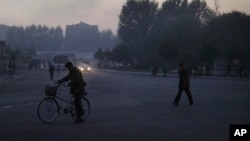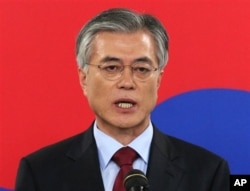In South Korea this week, a controversy has erupted over a nearly decade old U.N. North Korea human rights vote that could frame the 2017 presidential election as a clear choice between relying on punitive measures only to pressure the Kim Jong Un government to end its nuclear program, or renewing engagement efforts.
A recently published memoir by former Foreign Minister Song Min-soon alleged that in 2007 South Korea voted to abstain from a United Nation resolution to condemn North Korean human rights violations after consulting with Pyongyang.
One of the officials allegedly involved in the decision making process to consult with North Korea was Moon Jae-in, who is a prospective 2017 presidential candidate and former chairman of the opposition Minjoo party of Korea.
In 2007, Moon was chief of staff to President Roh Moo-hyun. In 2012 he ran for president in a three-way race, but lost to President Park Geun-hye.
Opposition under attack
The controversy has sparked a harsh debate in the National Assembly in Seoul, with the Minjoo Party denying there was any communication with North Korea prior to the U.N. vote.
Minjoo Party Spokesman Yoon Gwan-seok claims President Park’s ruling Saenuri Party is taking the incident out of time and context to attempt to smear Moon and the opposition as soft when it comes to dealing with the repressive North Korean state.
“They are using all intimidating words such as 'collusion', 'approval' and 'pro-North,'” said Yoon.
Moon has said the decision to abstain from the human rights vote was made by the Roh administration at a time when engagement polices, that emphasized increasing economic aid and exchanges, were fostering increased inter-Korean cooperation.
“If you go back to 2007, North and South Korea had a second Korean summit. North (and) South Korean prime ministers had agreed on 45 items for mutual cooperation. The situation in 2007 was quite different from now,” said North Korea analyst Moon Chung-in, who was an adviser to the late President Roh and holds the title of distinguished professor emeritus at Yonsei University in Seoul.
Ruling party on offense
But the former Minjoo party chairman has been vague about his role in the 2007 incident.
The Saenuri Party has gone on the offensive and is forming a task force to investigate if there was a conspiracy to consult with Pyongyang in advance of the vote, and what was the extent of Moon’s involvement.
“Moon Jae-in is ridiculing South Koreans by saying 'I do not remember' while he did not answer whether he agreed or opposed the North Korean human rights resolution,” said Saenuri Party Spokesman Kim Sung-won.
Larger debate
Prior to the 2012 presidential election, the Saenuri party accused Moon’s Minjoo Party of giving up South Korean sovereignty over the Northern Limit Line maritime border during a 2007 inter-Korean summit.
Later summit documents were declassified and it was revealed that both sides agreed to create a jointly enforced fishing and peace zone.
But the charge helped Park win by depicting her as a strong leader and Moon and his party as too easily manipulated by the Kim leadership in the North.
However during the legislative elections earlier this year, attempts made to depict the opposition as weak in the face of the increasingly aggressive and nuclear North were not so effective.
The opposition parties this year gained the majority in the National Assembly with many voters expressing concern over the Park administration’s hardline North Korea polices.
“I would argue that kind of so-called pro-North Korea coloring campaign has kind of become subject to the law of diminishing returns,” said Professor Moon.
Park’s critics say her exclusive reliance on punitive sanctions and strong military deterrence has not made the country safer nor have they restrained the North.
Kim Jong Un’s threatening rhetoric and his military’s continued nuclear and missile tests make it unlikely any South Korean party will endorse a return to unqualified engagement with the North.
But Professor Moon says whoever ends up as the opposition party candidate will likely offer an alternative to the status quo that will combine some hardline policies with dialogue and negotiation efforts.
Youmi Kim in Seoul contributed to this report.






